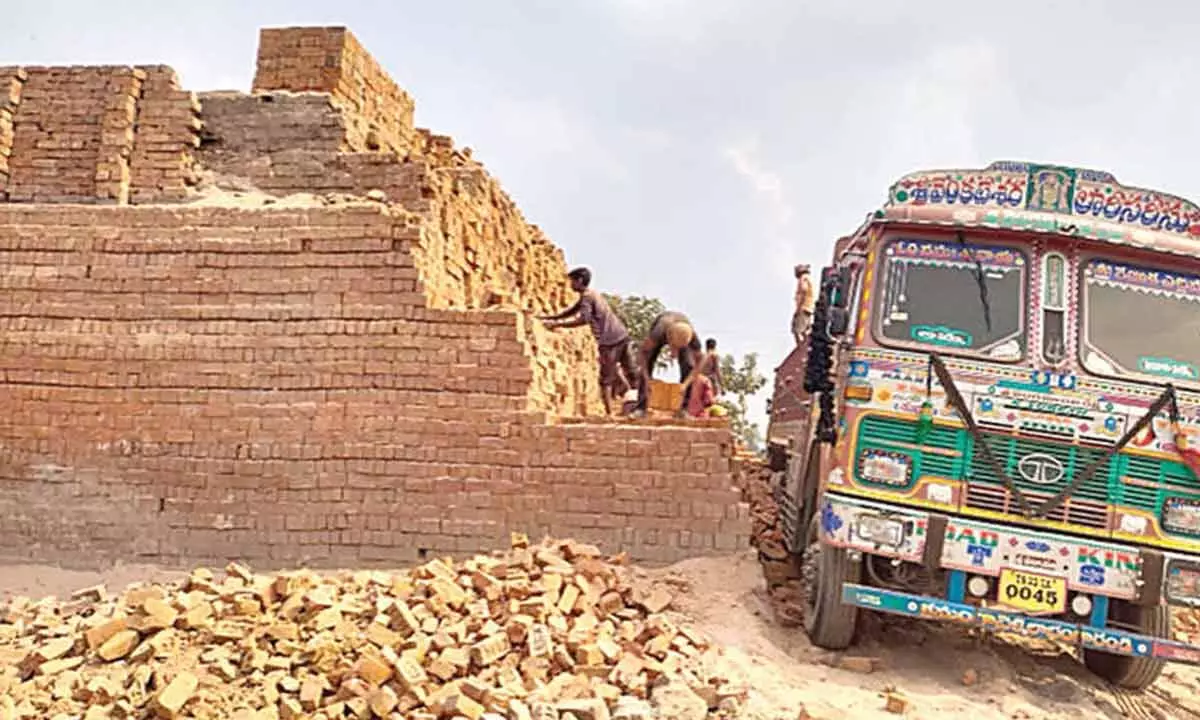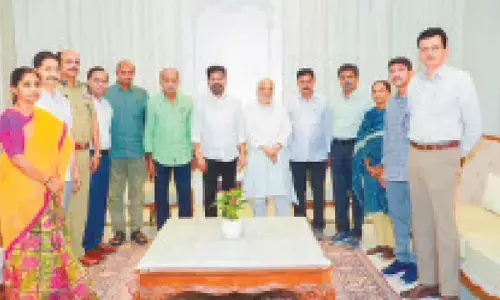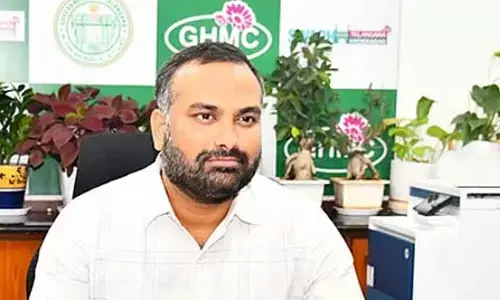Brick by brick: Childhood lost in dust, soot of brick kiln

Brick by brick: Childhood lost in dust, soot of brick kiln
- Ignored by the owners and authorities, children of migrant workers toil all the day at brick kilns to earn enough to fill their tummies
- They don’t study as their school was closed by the government four years ago
- Their habitation lacks playgrounds or parks for recreation
Karimnagar: The childhood means carefree life filled with enjoyment and games and no worry about how to fill the tummy as the mothers will run after children with plates full of goodies to feed them. But for the children of workers of the brick kiln, this is another world. Their tummy is filled when they work all day long at the brick klin along with their parents. Ignored by the owners, officials and the government, the childhood of the poor migrant workers'children islost in the dust and soot of the brick kilns. Being financially poor and not getting minimum wages and facilities, the migrants live in huts covered with polythenesheets. Their inhabitations are generally devoid of any facility, forget about playgrounds, parks and schools.
Four years ago,government removed the schools that were supposed to be near the workplaces to teach letters to the children of poor labourers. Now their childhood is wasted in toiling at the brick kiln. The lives of the Odisha labourers working in the brick kilns of the district in the joint Karimnagar district dependon the benevolence of owners. Harassment and attacks on labourers at the place of work has become routine. A few months ago, a four-year-old child died after coming under a vehicle at a kiln. In another incident, an Odisha worker was hit by an unknown vehicle near the kiln and died.
About a week ago, Karimnagar Regional CID, DSP Chelpuri Srinivas said that Odisha labourers working in a brick kiln at Nukapelli in Mallyala mandal are troubled by their employer and complained on Twitter to additional DGP Mahesh Bhagwat. He responded and issued instructions to the Karimnagar CID officials for an investigation. On the orders of Mahesh Bhagwat, CID DSP Srinivas reached Nukapelli with his staff and conducted an inquiry at the brick kiln and identified 13 labourers and took steps to bring their children safely to their native village.
Due to lack of regulation of brick making industry, workers and their children are not getting minimum facilities. As the minimum working hours are not implemented, they have to work from dawn to dusk, if necessary, under the lights of electric lamps. Along with the labourers, their children are also engaged in brick making, moving and earthworks. No matter how many times complaints are made to the Labour department that children are employed at the brick kiln, they do not care. If the authorities go for inspections, the owners will ensure that the situation is settled by the time they reach there. For this, the managers are selecting an area with special geographical conditions.
The owners who have been operating kilns in plain areas like Raghavapur, Rangapur, Hanmam Tunipet in Peddapalli mandal are gradually moving their industries to Gaureddypet area. The brick making industry took root in the area filled with mounds on three sides of Gaureddipeta and Raghavapur villages. As there is only one way for those coming and going here, it is known in advance that the authorities will come for inspections. As a result, the law violations that take place there go unnoticed to the outside world. In addition to the collection of soil required for brick making, the movement of Singareni coal and irregular working hours for laborers has become routine.
According to the Right to Education Act, the government must provide compulsory education to children below 14 years of age. Children of migrant laborers are dying in the furnaces without this law being observed.
If there are at least 20 children at one place officials have to set up a work side school (Bridge School). This process went smoothly until four years ago.About 10,000 Odisha labourers are working in 70 brick kilns in Peddapalli district.
According to the statistics of the Education Department, 380 to 400 school aged children work in the kilns. In the past, schools were established for every three or four kilns. It was decided to provide education in the mother tongue itself and education volunteers were brought from Odisha. The government entrusted the responsibility of teaching the children of labourers to the owners of the kilns. Due to the lack of supervision of the authorities, the management of the schools has turned into a mess. It was in this order that most of the children went to work in the kiln and barely came to school. The Education department does not know how many children are there in the work centres and how many of them are going to school.
Assistance labour officer told The Hans India that strict action will be taken against those who violate labour laws. Owners should provide minimum facilities in the work area. If workers work for more than 8 hours, they have to pay overtime. Legal action will be taken against those who neglect the provision of accommodation, clean drinking water, education and health of laborers' children. Cases are being registered against those responsible for harassing and beating workers.
Recently, the Pedpadelli police started Dhruva Schools with the aim of imparting corporate education to the children of brick kiln workers. He said that the migrant workers had left the state to work in the brick kilns for livelihood and it was not right for their children to work in the kilns without education. Dhruva schools have been started to provide corporate level education by talking to the employers so that they have a golden future, he said.








